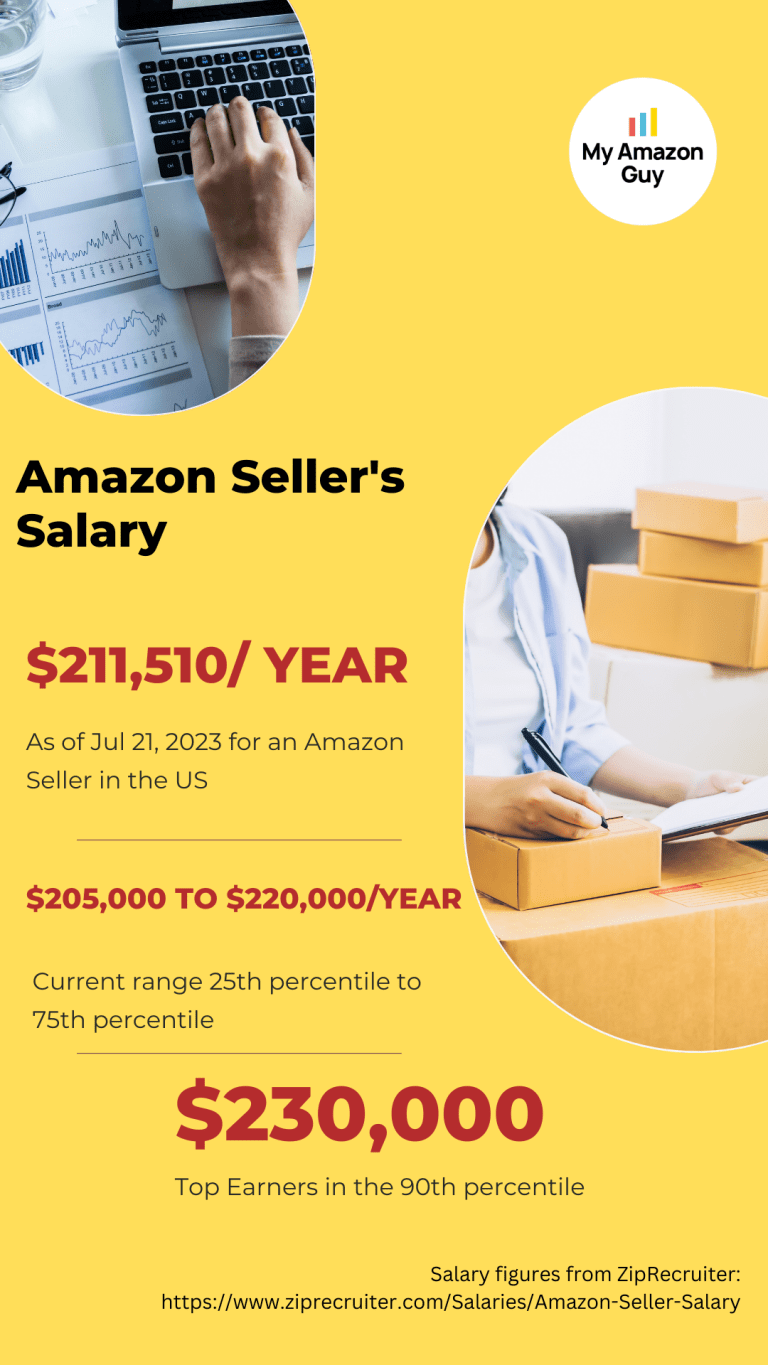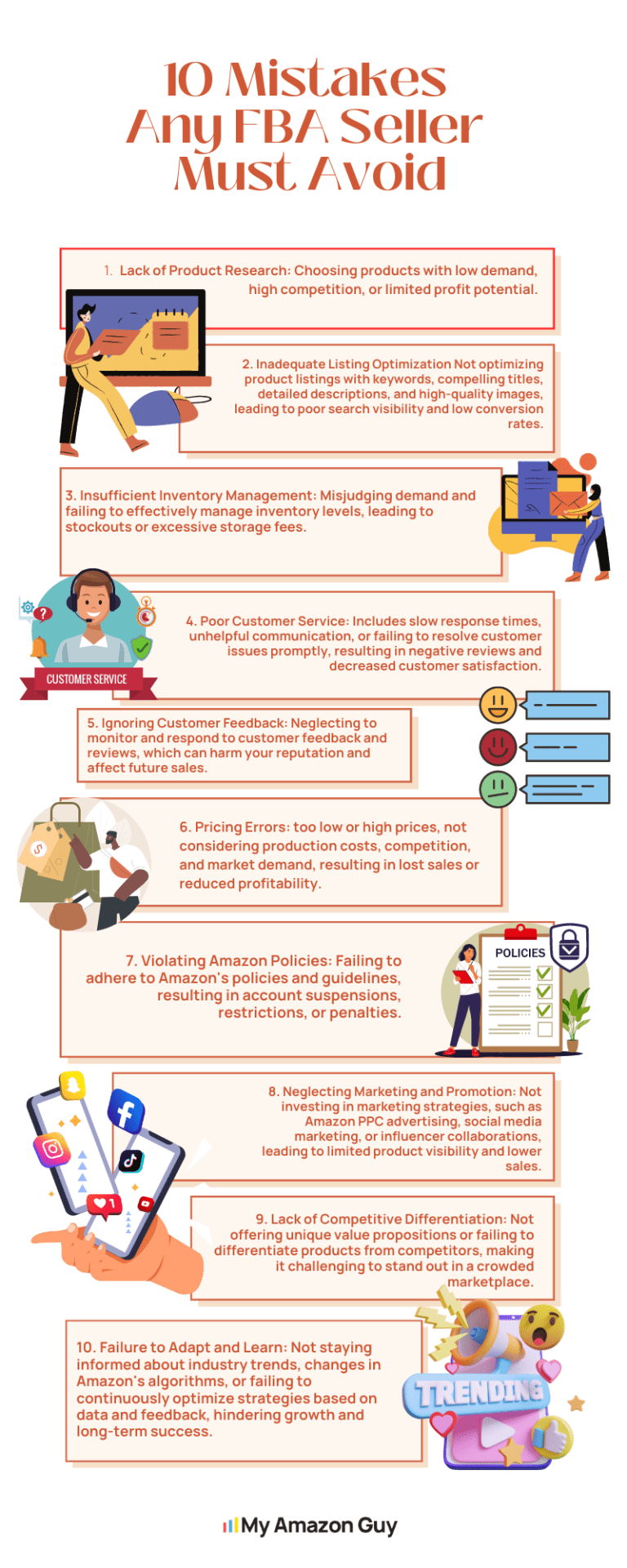“What does an FBA seller do?” If you’re intrigued by the idea of Amazon sellers raking in millions, you must be curious about what it takes to succeed as an FBA seller. It is crucial to grasp the duties of an FBA seller to determine if launching an Amazon business is a profitable venture.
In this blog post, we’ll unravel the mysteries behind the role of an FBA seller, the real possibility of making money as an Amazon seller, and other crucial questions.
What Does An FBA Seller Do
An FBA (Fulfillment by Amazon) seller is someone who utilizes Amazon’s fulfillment services to store, pack, and ship their products to customers. The process typically involves the following steps:
- Product Sourcing: The seller finds products to sell either by manufacturing their own products, sourcing from wholesalers, or using private label products.
- Product Listing: The seller creates a product listing on Amazon’s marketplace, including product title, description, images, and pricing.
- Inventory Management: The seller sends their products to Amazon’s fulfillment centers, where they are stored until they are sold.
- Order Fulfillment: When a customer places an order, Amazon takes care of picking, packing, and shipping the product on behalf of the seller.
- Customer Service: Amazon handles customer inquiries, returns, and refunds, providing customer support on behalf of the seller.
- Account Management: The seller manages their Amazon seller account, monitoring sales, optimizing product listings, and handling other aspects of their business.
Can you actually make money on FBA?
Amazon FBA seller salary and income potential
Amazon FBA (Fulfillment by Amazon) has become a popular way for individuals to start their own e-commerce businesses and generate income. With its vast customer base and efficient logistics system, Amazon provides a lucrative platform for sellers to reach a global audience. In this article, we will explore the salary and income potential of Amazon FBA sellers, answering common questions that arise in this regard.
What is the average Amazon FBA seller salary?
How much can Amazon FBA make a month?

The average Amazon FBA seller salary can vary significantly depending on various factors such as product selection, sales volume, profit margins, and overall business performance. It’s challenging to provide an exact figure without specific data.
However, many FBA sellers have built successful businesses that generate substantial income streams. It’s important to approach FBA with realistic expectations, conduct thorough market research, continually optimize your strategy, and leverage resources like MAG School courses and professional agency services to maximize your earning potential.
Can you make 6 figures with Amazon FBA?
Yes, it is possible to make six figures with Amazon FBA. Many sellers have achieved this level of success by identifying profitable product niches, effectively marketing their products, and optimizing their operations to maximize profits. However, it requires dedication, research, and a solid business strategy.
Can you be a millionaire with Amazon FBA?
There are Amazon sellers who have become millionaires and their stories of success can serve as great inspiration. But their millions were not wishes granted by a genie!
While becoming a millionaire solely through Amazon FBA is rare, it is possible for some sellers to achieve this milestone. Building a million-dollar business requires a combination of factors, including identifying highly profitable products, effective marketing, scaling operations, and continuous optimization.
If the idea of earning millions of dollars as an FBA seller seems like a far-fetched dream, it’s important to set a more achievable goal.
Can you actually make money on FBA?
Yes, you can definitely make money as a FBA seller. Many sellers have built successful businesses and generated significant profits by leveraging the benefits of FBA. By utilizing Amazon’s vast customer base, efficient fulfillment services, and Prime eligibility, sellers can reach a wider audience and increase their sales potential.
However, it’s important to note that profitability on FBA depends on various factors, such as product selection, pricing, competition, marketing efforts, and overall business strategy. Conducting thorough research, identifying profitable niches, and continuously optimizing your approach are key to maximizing your earning potential with FBA.
How long does it take to start making money on Amazon FBA?
The time it takes to start making money on Amazon FBA can vary. Some sellers may start generating profits within a few months, while others may take longer to establish a steady income stream. It depends on factors such as product selection, competition, marketing efforts, and the seller’s ability to adapt and optimize their business.
Once your Amazon FBA business starts generating revenue, you may wonder when you will receive payment from Amazon and how does Amazon pay you. In this video, Dustin Fenton, the VP of Finance for My Amazon Guy, provides an explanation of the timeframe for Amazon to pay FBA sellers.
How To Start Selling on Amazon FBA
How do I start as an FBA seller?
To start selling on Amazon FBA, you need to create a seller account on Amazon. Once you have registered, you can list your products, create product listings, and prepare your inventory to be shipped to Amazon’s fulfillment centers. Amazon provides step-by-step guidance throughout the process.
To help you get started on this adventure, here’s a comprehensive video tutorial from My Amazon Guy’s founder and CEO, Steven Pope, as he walks you through the step-by-step process of launching your FBA business.
Do you need a business for Amazon FBA?
Yes, to sell on Amazon FBA, you are required to have a business entity. Amazon requires sellers to have a professional selling account, which entails registering as a business entity and providing the necessary business information during the account setup process.
This includes details such as your business name, address, phone number, and tax identification number. It’s important to establish a legal business entity, such as a sole proprietorship, partnership, limited liability company (LLC), or corporation, to comply with Amazon’s seller requirements and ensure a legitimate business operation.
How much money do you need to sell on Amazon?
Selling on Amazon can be a great way to make money, but it’s important to understand the costs involved. Here are some things to consider:
- Acquiring inventory: Depending on the size of your operation, you may need to spend anywhere from a few hundred to tens of thousands of dollars on inventory. This is something you’ll need to factor into your budget.
- Fees: Amazon charges several fees for selling on their platform. These include referral fees, which are a percentage of the sale price, fulfillment fees, which cover the cost of shipping and handling, and monthly subscription fees for certain seller plans. The fees you’ll pay depend on the category and type of products you sell, so it’s important to do your research and understand what you’ll be charged.
- Budgeting: To ensure a successful and profitable selling venture on Amazon, you’ll need to carefully analyze your costs and budget accordingly. This means taking into account your inventory costs, fees, and any other expenses related to your business.
By understanding the costs involved in selling on Amazon, you can make informed decisions about your business and set yourself up for success.
Can you do Amazon FBA full-time?
Yes, it is possible to do Amazon FBA (Fulfillment by Amazon) full-time. Many sellers have transitioned from part-time to full-time FBA businesses as they see success and growth.
However, it’s important to note that running an FBA business full-time requires dedication, strategic planning, and continuous effort. It involves tasks such as product sourcing, inventory management, listing optimization, marketing, customer service, and more.
It’s essential to have a solid business plan, a sufficient budget, and the ability to adapt to market trends and changes. With the right approach, resources, and commitment, it is indeed possible to make Amazon FBA a full-time venture.
How many hours a week to sell on Amazon?
The number of hours required to sell on Amazon can vary depending on several factors, including the scale of your business, the number of products you sell, and your level of involvement in various activities such as product research, sourcing, listing optimization, marketing, and customer service.
Initially, starting an Amazon FBA business may require more time for tasks like product research, setting up accounts, and listing creation. However, once your business is up and running smoothly, the time commitment can vary depending on your goals and the level of automation and outsourcing you implement.
Some sellers may spend a few hours per week managing their operations, while others may dedicate full-time hours. It ultimately depends on your specific circumstances and the amount of effort you are willing to invest in your Amazon business.
How many items do you need to sell on Amazon FBA?
There is no specific minimum number of items you need to sell on Amazon FBA. You can start with as few as one product or scale up to sell hundreds or even thousands of different items.
The number of items you choose to sell depends on various factors, including your business goals, budget, resources, and market research. It’s important to focus on quality over quantity and select products that have demand, are profitable, and align with your target audience.
Building a successful FBA business involves careful product selection, effective marketing, and continuous optimization to maximize your sales and profitability.
Who pays for shipping to FBA?
The FBA seller is responsible for shipping the inventory to Amazon’s fulfillment centers. The seller covers the cost of shipping the products to Amazon’s designated locations.
Once the inventory is received by Amazon, the responsibility for storage, packaging, and shipping to customers is transferred to Amazon.
Amazon charges fees for these services, such as storage fees and fulfillment fees, which are deducted from the seller’s account. It’s important for sellers to factor in these costs when determining their pricing and overall profitability on the platform.
You may use our Dimensional weight calculator to determine how much you’ll pay to ship your items to Amazon. For a guide on how to reduce your FBA fees, watch another video from Steven below.
Amazon FBA Challenges And Difficulties
How hard is it to sell on Amazon?
Selling on Amazon can be both challenging and rewarding. While the platform offers immense opportunities for businesses of all sizes, it also presents a highly competitive marketplace.
The level of difficulty in selling on Amazon can depend on various factors such as product selection, pricing, marketing, listing optimization, and understanding Amazon’s policies and algorithms. It requires a solid understanding of the platform, continuous learning, and adaptation to market trends.
Additionally, managing inventory, customer service, and dealing with potential issues like product returns or negative reviews can add to the complexity. However, with proper research, planning, and execution, it is possible to succeed on Amazon.
Many sellers have built successful businesses by leveraging the platform’s vast customer base and powerful fulfillment options. It’s important to approach selling on Amazon with a strategic mindset and a willingness to learn and adapt to the ever-changing e-commerce landscape.
What is the disadvantage of Amazon FBA?
While Amazon FBA offers numerous advantages for sellers, there are a few potential disadvantages to consider:
- Fees: Amazon charges various fees for FBA services, including storage fees, fulfillment fees, referral fees, and other incidental fees. These costs can impact your profitability, especially if you have slow-moving or oversized inventory.
- Limited Control: When you use FBA, Amazon takes care of storage, packaging, and shipping. While this can be convenient, it also means that you have less control over these aspects of your business. Additionally, Amazon’s policies and guidelines must be followed, which may limit your flexibility in certain areas.
- Competition: Amazon is a highly competitive marketplace, and standing out among other sellers can be challenging. You’ll need to invest time and effort into optimizing your listings, managing inventory, and implementing effective marketing strategies to gain visibility and sales.
- Inventory Management: With FBA, you must maintain sufficient inventory levels at Amazon’s fulfillment centers to avoid stockouts. Balancing inventory levels, especially during peak seasons, can be a logistical challenge.
- Returns and Customer Service: Amazon handles customer returns and customer service inquiries for FBA orders. While this can save time, it also means that you have less direct control over these aspects of the customer experience.
Is Amazon FBA too late?
It is not too late to be a FBA seller. While the marketplace has become increasingly competitive over the years, there are still ample opportunities for new sellers.
Amazon continues to grow, attracting millions of customers worldwide, and the demand for online shopping is on the rise. With the right product selection, effective marketing strategies, and a commitment to providing value to customers, it is still possible to succeed on Amazon FBA.
However, it’s important to conduct thorough market research, identify profitable niches, and differentiate your products from competitors to stand out in the crowded marketplace. Adapting to changes in Amazon’s policies and algorithms and continuously optimizing your listings and marketing efforts will also be crucial for long-term success.
While it may require more effort and strategic planning compared to when Amazon FBA was less saturated, it is still a viable opportunity for entrepreneurs and businesses to thrive.
Best Practices To Avoid Failing As FBA Seller

To increase the chances of success as an Amazon FBA seller and avoid common pitfalls, here are some best practices to consider:
- Thorough Market Research: Conduct comprehensive market research to identify profitable product opportunities. Analyze market trends, competition, and customer demand to choose products with high potential.
- Competitive Product Differentiation: Differentiate your products from competitors by offering unique features, high-quality packaging, bundling, or improved customer experience. Adding value and standing out in a crowded marketplace can help attract customers and increase sales.
- Optimized Product Listings: Invest time and effort into optimizing your product listings. Use relevant keywords, compelling product titles, detailed descriptions, high-quality images, and bullet points to improve search visibility and conversion rates.
- Pricing Strategy: Develop a pricing strategy that balances profitability and competitiveness. Consider factors such as production costs, Amazon fees, market demand, and competitor pricing to set optimal prices.
- Inventory Management: Implement effective inventory management practices to ensure adequate stock levels, minimize storage fees, and avoid stockouts. Utilize inventory forecasting tools and monitor sales trends to optimize inventory replenishment.
- Customer Service Excellence: Prioritize exceptional customer service to build a positive reputation. Respond promptly to customer inquiries, resolve issues promptly, and strive to exceed customer expectations. Positive customer feedback and reviews can boost sales and trust in your brand.
- Marketing and Promotion: Develop a comprehensive marketing strategy to increase product visibility and drive sales. Utilize Amazon PPC advertising, social media marketing, influencer collaborations, and other promotional tactics to reach a wider audience.
- Continuous Learning and Adaptation: Stay updated with Amazon’s policies, industry trends, and changes in the marketplace. Continuously evaluate and optimize your strategies, adapt to customer preferences, and be open to learning from both successes and failures.
By following these best practices, sellers can position themselves for success on Amazon FBA and minimize the chances of failure. However, it’s important to remember that success may take time and effort, and continuous improvement and adaptation are key to long-term growth.
Conclusion: Is It Worth Becoming A FBA Seller
Considering the vast opportunities and success stories of many FBA sellers, it can be worth pursuing if you are willing to invest the time, effort, and resources required to build and grow a successful Amazon FBA business.
Becoming an Amazon FBA seller can be a worthwhile endeavor for many individuals and businesses. Considering the vast opportunities and success stories of many FBA sellers, it can be worth pursuing if you are willing to invest the time, effort, and resources required to build and grow a successful Amazon FBA business.
My Amazon Guy also provides a wide range of resources, tools, information, and services to individuals who are passionate about succeeding in the largest marketplace. We are here to help you succeed!





